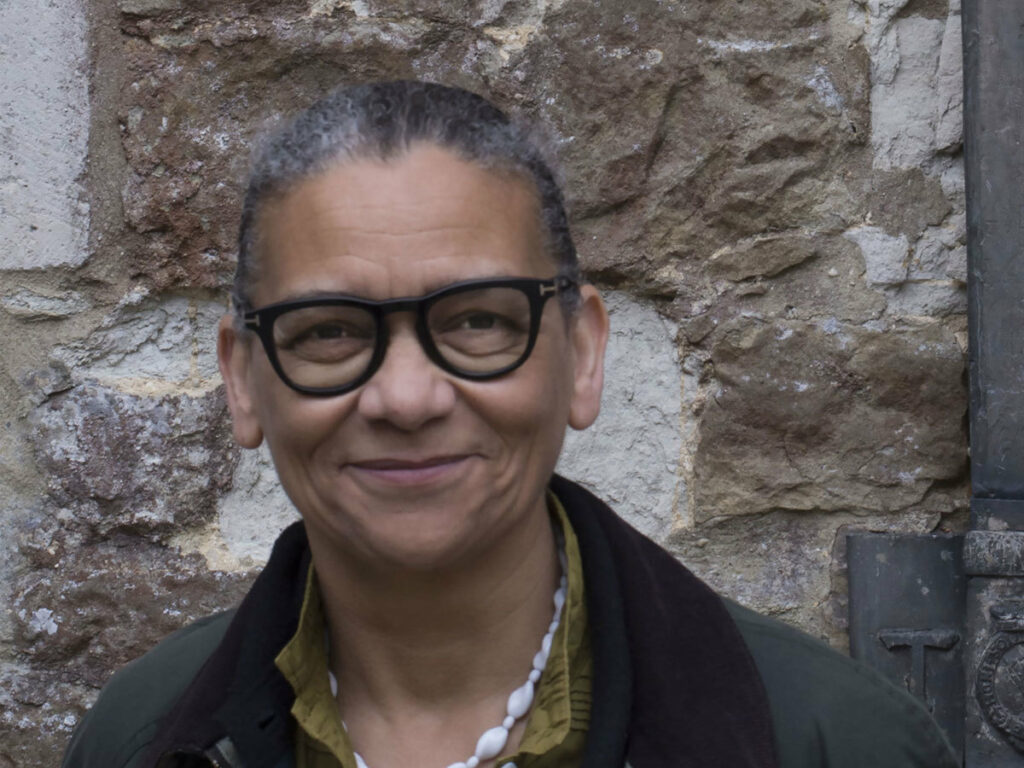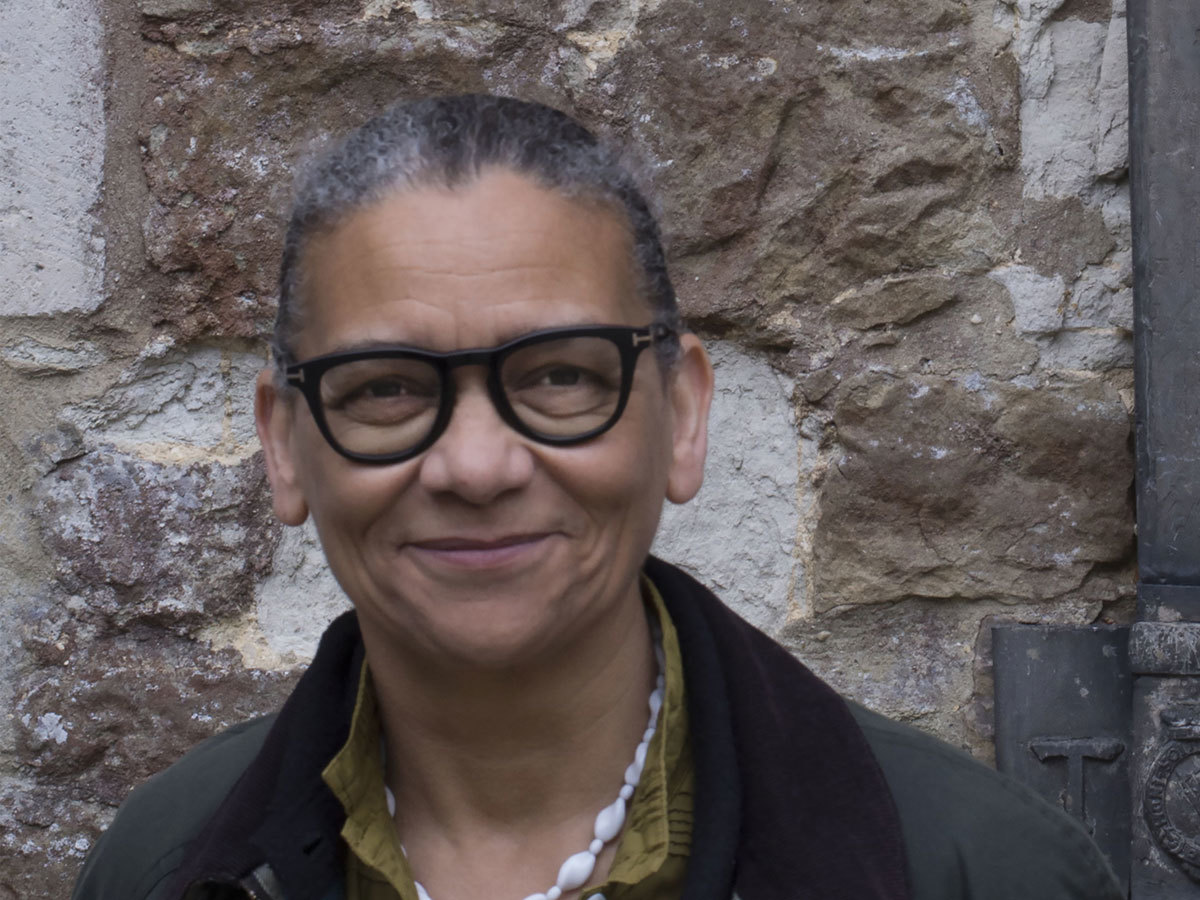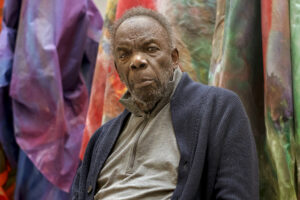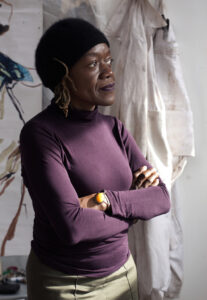Lubaina Ramadhan Abdulla Himid
Lubaina Himid CBERA (born 1954) is a British artist and curator. She is a Professor of Contemporary Art at the University of Central Lancashire. Her art focuses on themes of cultural history and reclaiming identities.
Himid was one of the first artists involved in the UK’s Black Art movement in the 1980s and continues to create activist art which is shown in galleries in Britain, as well as worldwide. Himid was appointed MBE in June 2010 for services to Black Women’s Art, won the Turner Prize in 2017 and was promoted to CBE in the 2018 Queen’s Birthday Honours for services to Art.
1954
Zanzibar
British
Himid was born in Zanzibar Sultanate (then a British protectorate, now part of Tanzania) in 1954 and moved to Britain with her mother, a textile designer, following the death of her father when she was just four months old. She attended Wimbledon College of Art where she studied Theatre Design, obtaining her BA in 1976. She received her MA in Cultural History from the Royal College of Art in London in 1984.
Himid’s practice insists that racism is not just the preserve of the conservative right, but is as much a part of liberalism: her series Negative Positives: The Guardian Archive (2007-15) painted newspaper pages drawing attention to the portrayal of Black people in the British press. Considering how the legacies of slavery and colonialism are still ongoing in the present, historical violence sometimes haunts Himid’s subjects. Her work Le Rodeur: The Exchange (2016) responds to the murder of enslaved people on a French slave ship in 1819 – drowned because they were considered no longer profitable after contracting an eye disease. The painting portrays a series of Black figures, one with a bird’s head, who gather in an abstract interior overlooking the sea: a surreal and speculative vision of otherworldly times and places or possible futures to come. Following exhibitions at Modern Art Oxford, Spike Island Bristol and Nottingham Contemporary, Himid won the 2017 Turner Prize, and was the subject of a major retrospective at Tate Modern in 2021.
Himid has organised several exhibitions of work by Black women artists, including Black Woman Time Now at the Battersea Arts Centre in London (1983) and Five Black Women, an exhibition in 1983 at the Africa Centre, London. Other exhibitions include: Into the Open (1984), The Thin Black Line (1985), Unrecorded Truths(1986), Out There Fighting (1987), New Robes for MaShulan (1987), and State of the Art (1987). Into the Open, presented at Mappin Art Gallery in Sheffield, was widely regarded as the first major exhibit of the new generation of Black British artists. Naming the Money (2004), presents an exuberant crowd of 100 enslaved people, in the roles they played in the princely courts of Europe: everything from dogtrainers, toymakers and mapmakers to dancing masters, musicians and painters. They were bought as the ‘property’ of wealthy Europeans at a time when Africans were regarded as units of currency and Black servants were status symbols. Encountering these victims of eighteenth century human trafficking, the visitor learns their original identities as well as those imposed on them.
Himid was appointed MBE in the June 2010 Birthday Honours for services to Black Women’s Art.
In 2017 Himid became the first Black woman to win the Turner Prize. She was the oldest person to be nominated for the prize since the rules changed to allow nominations of artists over the age of 50.
Apollo magazine named Himid as 2017 Artist of the Year.
Himid was promoted to CBE in 2018 for services to Art.”
Himid was elected a Royal Academician in 2018.
What makes Himid’s story so remarkable is not just the strength of her practice, but her tireless support for her Black peers, which has shaken up and reshaped the narrative of art history. Her voice has given strength and power to Black artists from all around the world, including Kara Walker, Ellen Gallagher, Chris Ofili and Yinka Shonibare. Writer Niru Ratnam states that “Himid’s continued insistence that nativism, racism and exploitation wouldn’t go away as easily as most hoped looks now to have been correct, and as a result, her critical vision is more relevant than ever.”
https://www.bbc.co.uk/news/entertainment-arts-48485172
https://www.frieze.com/article/women-arts-lubaina-himid-long-road-winning-2017-turner-prize
https://sounds.bl.uk/related-content/TRANSCRIPTS/021T-C0466X0249XX-0000A0.pdf
https://www.royalacademy.org.uk/art-artists/name/lubaina-himid-ra-elect
https://en.wikipedia.org/wiki/Lubaina_Himid
https://www.tate.org.uk/whats-on/tate-modern/lubaina-himid
https://www.google.com/search?q=Lubaina+Himid+CBE,+RA&source=lnms&tbm=isch&sa=X&ved=2ahUKEwiIxu7ppJj3AhXXgVwKHS6aAA4Q_AUoAXoECAIQAw&biw=1280&bih=577&dpr=1.5



